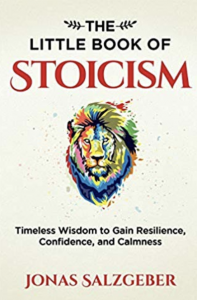 I recently read “The Little Book of Stoicism: Timeless Wisdom to Gain Resilience, Confidence, and Calmness” by Jonas Salzgeber. Below are the quotes I found most interesting. if you like the quotes, buy the book here.
I recently read “The Little Book of Stoicism: Timeless Wisdom to Gain Resilience, Confidence, and Calmness” by Jonas Salzgeber. Below are the quotes I found most interesting. if you like the quotes, buy the book here.
“The Stoics were living proof that it’s possible for someone to be exiled to a desert island and still be happier than someone living in a place. They understood very well that there’s only a loose connection between external circumstances and our happiness.” (4)
“Stoics recognized that the good life depends on the cultivation of one’s character, on one’s choices and actions rather than on what happens in the uncontrollable world around us.” (4)
“Epictetus wrote, “So, what should each of us say to every trial we face? This is what I’ve trained for, this is my discipline!” Hey, a boxer who gets punched in the face won’t leave the ring, it’s what he prepared for, it’s his discipline.” (18)
“Stoicism has nothing to do with suppressing or hiding one’s emotions or being emotionless. Rather, it’s about acknowledging our emotions, reflecting on what causes them, and learning to redirect them for our own good.” (21)
“It’s more about unslaving ourselves from negative emotions, more like taming rather than getting rid of them.” (21)
“We can train ourselves to act calmly despite feeling angry, act courageously despite feeling anxious.” (21)
“The goal isn’t to eliminate all emotions, the goal is to not get overwhelmed by them despite their immense power.” (22)
“For the Stoics, positive emotions are more like an added bonus than a motive by themselves.” (23)
“Since every man dies, it is better to die with distinction than to live long.” -Musonius Rufus (32)
“It never ceases to amaze me: we all love ourselves more than other people, but care more about their opinion than our own.” -Marcus Aurelius (34)
“A tower of strength can be born the moment you decide to give outside events no more power over you.” (39)
“Brian Johnson translates arete as “Expressing the highest version of yourself moment to moment to moment.”” (41)
“Eudaimonia, to live a happy and smoothly flowing live. To achieve this goal, we need to be on good terms with our inner daimon, the highest version of ourselves, our natural inborn potential.” (41)
“In whatever you do, imagine there are two lines: the higher line indicating what you’re capable of and the lower line what you’re actually doing.” (41)
“Handing power to things we have no direct control over causes emotional suffering.” (57)
“If we define success as giving our best in the process, then we cannot fail, feel calmly confident, and can accept any outcome with equanimity.” (63)
“Just because we should try to accept whatever happens does not mean we approve of it. It just means that we understand that we cannot change it.” (67)
“For the Stoics, the only good lies in our voluntary actions, and our actions can only be voluntary when we’re bringing awareness into every moment.” (96)
“Epictetus says that as philosophers we should adapt to whatever happens, so that nothing happens against our will and nothing that we wish for fails to happen.” (111)
“Marcus Aurelius has a trick to bring his will into harmony with reality. He compares what happens to us to what a doctor prescribes to us. Just like you take some medicine when a doctor tells you to, we should take external events as they are, because they’re like the medicine there to help us.” (112)
“What happens to us is nature’s treatment to become better people. Those things happen for us, not against us, even if it doesn’t seem so.” (112)
“Epictetus says that if you fulfill your duties toward others, then you’re living in agreement with nature.” (147)
“People who are excited by posthumous fame forget that the people who remember them will soon die too.” -Marcus Aurelius
“We’re better off if we’re indifferent to fame and social status. After all, it’s not within our control.” (151)
“By seeking social status, we give other people power over us. We have to act in a calculated way to make them admire us, and we must refrain from doing things in their disfavor. We enslave ourselves by seeking fame.” (151)
“Epictetus observes, “Freedom is not achieved by satisfying desire, but by eliminating it.” (154)
“It’s not about not playing video games, not watching TV, not working full-time – it’s about the awareness and purposefulness we bring into these things. We can still choose to do whatever we think is worth spending our time with.” (166)
“You are disturbed not by what happens, but by your opinion about it.” (173)
“Nothing but opinion is the cause of a troubled mind.” (173)
“Harm does not come from what happens – an annoying person or unloved situation – but from your reaction to it.” (173)
“He who does not desire anything outside his control cannot be anxious.” (183)
“Don’t wish for life to be hard, but neither wish for it to be easier when it gets tough. Rather wish for the strength to deal with it. It’s an opportunity for growth.” (198)
“Epictetus says, “We would do better to remember how we react when a similar loss afflicts others.” (205)
“Seneca says, Let philosophy scrape off your own faults, rather than be a way to rail against the faults of others.” (258)
Liked the quotes? Buy the book here.


Hi trying to find the saying, leave the body ,look down on yourself from above, bed house ,town Earth ext, would be helpful if someone could point me to the page